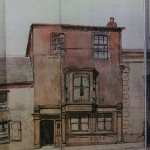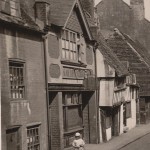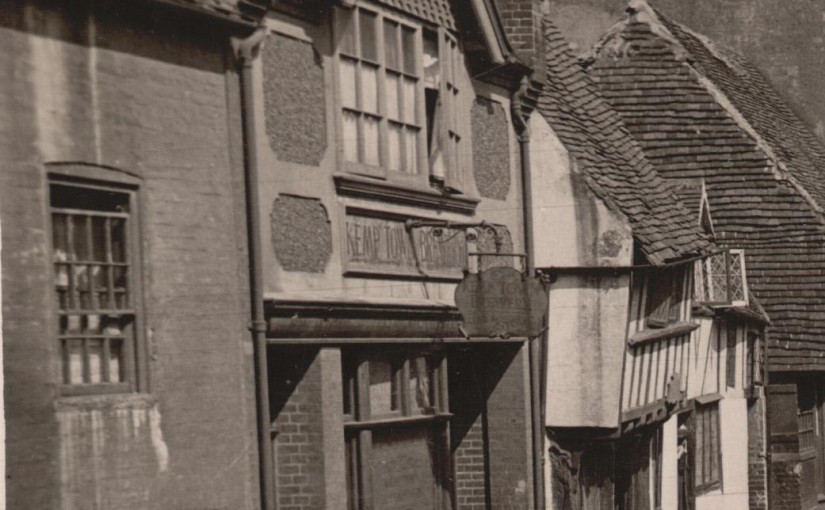by John Hodges
Over the years many small pubs and beer houses have come and gone in the Old Town of Hastings, none more so than in All Saints Street and the twittens that run in to it from both sides. Some of these premises have a very complete history, of some virtually nothing is known, whilst others never aspired to being identified by a name. However since the time of Henry VII a form of license had been around to control such premises, and a name or description would have existed if for no better reason than to give an understanding to Parliament where potential billeting for troops existed in a town. Beyond this very practical reason the two main objectives of licensing law were to control the amount of drinking, and to protect the public from any monopolistic exploitation that might be associated with the granting of licenses. Justices have always held wide discretionary powers in the administration of the licensing laws, and only in the period 1830 – 1869 were their powers partially removed.


An act of 1830 provided for a beer house to operate merely on the payment of an excise license, and without an accompanying Justice’s licence. This legislation provided only for a house selling beer, as those selling wines and spirits still required a Justice’s licence. Needless to say this act was the catalyst in the proliferation of such establishments many of which were in a squalid condition, virtually unpoliceable, and contributory to the rise in drunkenness. In 1869 another act was passed that sought to return the responsibility for the grant of licenses to the licensing justices. The consequences of this legislation was a vast reduction in the number of licensed premises, although it still offered limited protection to all of those licenses granted prior to 1869. Even the provisions of this act were not considered sufficient to satisfy the Royal Commission on the Liquor Licensing Laws (Peel Commission) that reported in 1899. Further large reductions in licensed premises were still a requisite for effective policing, and the improvement in status of the premises and the licensee in general.
At this point the only reasons open to the licensing justices for the removal of a licence were based upon the improper management of the beer house, or the bad character of the applicant. The licensing Act of 1904 that followed the publication of the Peel Commission now provided other means by which existing licenses could be extinguished. The main feature of the Act was to set up a fund by exercising a levy on the existing licences within the district, for the purpose of providing compensation to those licensees who then lost theirs. This Act provided for the removal of licenses not only on the basis of transgression, but also on the grounds of redundancy. This allowed the authorities to prove by a series of inspections that a need no longer existed for a particular pub, usually in an area considered to be over populated with such establishments. These new measures had the effect, particularly in the Old Town of Hastings and central St.Leonards, of greatly reducing the numbers of beer houses and pubs that had been born out of the 1830 relaxation of the licensing laws.
Some of these beer houses that were created under the 1830 Act, and subsequently met their demise under the Act of 1904 we know by name, but little more. Others opened under the same act but were closed for the more traditional reasons, or quite simply by the lack of the market forces needed to keep them financially viable. I list below those beer houses recorded as trading in the area of All Saints Street as a result of the 1830 Act, and closing as a result of the subsequent Act of 1904.
FISHERMANS HOME BEER HOUSE – 6,EAST HILL PASSAGE
Apart from the granting of a beer house licence to Ellen Lester around 1870 little else is known. The premises were used as a lodging house and bar but after 1877 all records of the premises cease.
CATT BEER HOUSE – 46 and a half, ALL SAINTS STREET
Little is known of the history except that it took its name from Charles Catt who is recorded as the landlord between 1862 and 1866. It is likely that together with the adjoining property it eventually became the Hope of Freedom beer house.
FISHERMANS ARMS BEER HOUSE- ALL SAINTS STREET
Virtually nothing is known of this beer house except for a license granted to William Gurr in 1859.
HADDON BEER HOUSE – 118,ALL SAINTS STREET
Again nothing is known of the history of this beer house except for the grant of a licence to J.Haddon in 1845.
MERRY CHRISTMAS BEER HOUSE – 59,ALL SAINTS STREET
This was another lodging house with bar room facilities. It was mentioned in the “Returns under the Common Lodging Houses Act 1851” and described as having twelve double beds to let. It would appear that a licence was first granted to Edward Parris in 1848 but at some time during the 1850s there was probably a change of usage that did not require the retention of that licence.
NEW MOON BEER HOUSE – 45-46,ALL SAINTS STREET
When Robert Moon took over the Hope of Freedom beer house in 1878 it would appear that he changed the name to the New Moon. The Moon family continued to run premises as a lodging house and bar until 1891. During the next seventeen years it changed hands several times until 1908 under the stewardship of Vincent Orsi the beer house was finally declared as redundant and referred for compensation. Despite formal objections from the owners Watney, Combe, Reid & Co., redundancy was proved and they were awarded £1010 for the loss of their license.
HOPE OF FREEDOM BEER HOUSE ALL SAINTS STREET
Probably formed from the merger of a small beer house and the adjoining property and by 1872 has assumed this name, which lasted until 1878 when it was taken over by a new owner.
OLD HOUSE AT HOME BEER HOUSE – 44, ALL SAINTS STREET
This was previously the Ball beer house under the ownership of Richard Ball until around 1866, when with a change of licence to James Cole it assumed the name of the Old House at Home. This name which was given to numerous pubs and beer houses throughout the country, comes from a nineteenth century ballad written by Thomas Haynes. Very topically with recent events in mind this music first appeared during 1838 in Edward Loder’s opera “Francis the First”. It would appear that this beer house closed around 1911.
NEW INN BEER HOUSE – 124,ALL SAINTS STREET
For reasons of completeness I have included the New Inn which received its beer house licence as a result of the 1869 Act rather than the earlier 1830 legislation. The New Inn was also not an immediate casualty of the 1904 Licensing Act but in fact did not close until 1925 when it was referred for compensation. At that time it was trading to the satisfaction of its owners, the Kemp Town Brewery of Brighton, but the licensing justices were not persuaded by the owners, the licensee, apetition signed by over one hundred customers, or the advocacy of the appointed solicitor.
BALL BEER HOUSE – ALL SAINTS STREET
There is a record showing the existence of the Ball beer house in 1855, no doubt taking its name from the licensee Richard Ball when it opened. By the 1860,s this name had disappeared from the records.
ALMA TAVERN – 95,ALL SAINTS STREET
Early records tell us that 95 All Saints Street was for many years a pawnbroker’s business. Sometime in the 1850’s the property was bought by Belville Tyrell who obtained a licence for the premises, to open as a beer house with lodging accommodation, it was actually listed as an hotel. Many licensed premises of the day took on patriotic names and it is no surprise that the first battle of the Crimean War in 1854, when an Anglo-French force under General St.Arnaud and Lord Raglan defeated General Menshikov’s Russian army just south of the River Alma in the Crimea, provided the name for the Alma Tavern. Belville Tyrell retained ownership until 1883 when it was transferred to W.Sellings. Between 1889 and 1906 the licence changed hands five more times with A.Broocks being the last in line when the Alma Tavern finally closed in 1908. A.Broocks continued for many more years as the owner of the property, which following its demise as a beer house, provided a living for its owner as a general store. In keeping with many of the back street beer houses of this time, the Alma Tavern was declared redundant at the Brewster Sessions of 1908, and referred for compensation. The owners of the freehold, Messrs Leney & Co, of Dover, fought the compensation order but to no avail, and a settlement of £1204 was finally agreed upon. The original building, together with the adjoining property, was demolished under one of the post war slum clearances and remained as a building plot until the early 1960s, when the Borough Council rebuilt both properties as the flats that we know today.
HARBOUR BAR – 77,ALL SAINTS STREET
Early records show that this property was for many years a dressmakers, which in 1854 became a general store under the ownership of Samuel Betts, a local fisherman who no doubt saw this as an opportunity to supplement his income. Although the first mention of 77, All Saints Street as a beer retailer occurs in 1871, it is most likely that an excise license for the sale of beer was obtained sometime prior to 1869 under the provisions of the 1830 Beer House Act. In 1895 the license was acquired by J.Friend, who by 1897 was trading under the name of the “Harbour Bar”. At the turn of the century the licensed premises were being run by W.Allen, they then passed on in 1901 to John Newham and subsequently to R.Woolven in 1902. The final landlord of this short lived hostelry was William Clifford who held the licence from 1905 until its final closure in 1906.
It is recorded that within the last six and a half years of its existence, the licence had changed hands nine times, although the trade was not minimal, extending to 117 brewers barrels and a considerable amount of bottled beer in its final year. The case for the Harbour Bar’s closure was based upon its lack of need by the community, there being a further 37 licensed premises within a quarter of a mile. Despite the protestations of Watney, Combe, Reid & Co., the owners of the freehold the Harbour Bar was declared redundant at the 1906 Brewster Sessions, and referred to the Compensation Committee who settled with the owners at an estimated value of £450. Following this interlude as licensed premises, 77, All Saints Street became known as Buckingham House and continued to pass through the hands of several more owners until it fell into a state of dilapidation, and was subsequently rebuilt in the early 1960s together with the adjoining properties as the family home that we know today.
There were doubtless other similar establishments in the area that came and went during this period, and others that still exist to this day. Records of beer houses are sparse, and although their role in the social history of a neighbourhood is significant, little history or indeed photographic evidence exists but for a few.
“Rye’s Own” June 2013
All articles, photographs, films and drawings on this web site are World Copyright Protected. No reproduction for publication without prior arrangement. © World Copyright 2015 Cinque Ports Magazines Rye Ltd., Guinea Hall Lodge Sellindge TN25 6EG
